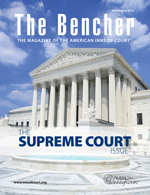Court Disqualifies Firm Based on Representation of Affiliated Subsidiary
The Bencher—July/August 2016
By Francis G.X. Pileggi, Esquire

 This ethics column provides highlights of a recent decision in which the court disqualified a law firm based on a conflict of interest that arose in connection with the law firm’s representation of two subsidiaries. In the case styled Atlantic Specialty Insurance Company v. Premera Blue Cross, 2016 WL 1615430 (W.D. Wash. April 22, 2016), the court was presented with a motion to disqualify the law firm representing Premera (“Law Firm”) based on the concurrent representation by the Law Firm of an affiliate of the plaintiff, Atlantic, in a separate and unrelated matter. In this insurance coverage dispute, Atlantic sought a declaration that it had no duty to defend Premera under the policy issued by Atlantic regarding an underlying class action suit filed against Premera.
This ethics column provides highlights of a recent decision in which the court disqualified a law firm based on a conflict of interest that arose in connection with the law firm’s representation of two subsidiaries. In the case styled Atlantic Specialty Insurance Company v. Premera Blue Cross, 2016 WL 1615430 (W.D. Wash. April 22, 2016), the court was presented with a motion to disqualify the law firm representing Premera (“Law Firm”) based on the concurrent representation by the Law Firm of an affiliate of the plaintiff, Atlantic, in a separate and unrelated matter. In this insurance coverage dispute, Atlantic sought a declaration that it had no duty to defend Premera under the policy issued by Atlantic regarding an underlying class action suit filed against Premera.
Atlantic’s corporate structure is key to understanding the court’s decision. Atlantic is a wholly-owned subsidiary of OneBeacon Insurance Group (“Parent”). Homeland Insurance Company of New York (“Homeland”) is also a wholly-owned subsidiary of Parent. Both Atlantic and Homeland share the same mailing address and principle place of business as Parent. Both subsidiaries also share claims-handling services that are managed by the same claims unit personnel.
In July 2015, Parent received a claim on a policy issued by Homeland to AAM, Inc. Law Firm was hired to represent Homeland in a coverage dispute with AAM. In December 2015, Atlantic initiated the instant litigation against Premera, seeking a declaratory judgment that it had no duty to defend Premera under the policy that was issued to it by Atlantic. Law Firm had been representing Premera in the underlying litigation and entered its appearance on behalf of Premera in the declaratory judgment action.
In-house counsel for Atlantic notified Law Firm that there was a conflict of interest because Law Firm represented Atlantic’s sister subsidiary, Homeland, in the AAM matter. Thus, Atlantic took the position that there was a conflict of interest because Atlantic and Homeland, as subsidiaries of Parent, consider themselves one client. They did not consent to the Law Firm being adverse to them in the instant case. The Law Firm refused to withdraw and a motion to disqualify was filed. Law Firm’s position was that Atlantic and Homeland are two distinct corporations and should not be considered one client for purposes of an analysis of conflicts of interest. The court disagreed with that position.
After this issue arose, the Law Firm withdrew its representation of Homeland and argued that the appropriate analysis at that point was based on the rule that applies to conflicts with former clients. The court applied Rule 1.7 of the State of Washington’s Rules of Professional Conduct, which applies to conflicts with current clients. The representation of Homeland was concurrent with the representation adverse to Atlantic. The Law Firm’s subsequent termination of representation of Homeland did not make the rule for former clients applicable. Sometimes referred to as the “hot potato” rule, the policy supporting the avoidance of conflicts would be subverted if firing one client, after a conflict arose, would allow the more lenient Rule 1.9 to apply.
The more stringent rule relating to current conflicts, Rule 1.7, provides that unless certain requirements are met, “a lawyer shall not represent a client if the representation involves a concurrent conflict of interest. A concurrent conflict of interest exists if: (1) the representation of one client would be directly adverse to another client; or (2) there is a significant risk that the representation of one or more clients will be materially limited by the lawyer’s responsibility to another client, a former client or a third person or by a personal interest of the lawyer.”
Rule 1.9 applies to the duties of a lawyer to former clients and provides that: “A lawyer who has formerly represented a client in a matter shall not thereafter represent another person in the same or a substantially related matter in which that person’s interests are materially adverse to the interests of the former client unless the former client gives informed consent, confirmed in writing.” Comment 3 to Rule 1.9 provides that “matters are ‘substantially related’ for purposes of this Rule if they involve the same transaction or legal dispute or there otherwise is a substantial risk that confidential factual information as would normally have been obtained in the prior representation would materially advance the client’s position in the subsequent matter.”
Rule 1.7 is less forgiving than Rule 1.9 and disqualifies an attorney from concurrently representing two clients with adverse interests, even if the matters are wholly unrelated. The court reasoned that the two subsidiaries involved in this matter should be treated as one client for purposes of a conflicts analysis. They share the same mailing address and principle place of business. Both entities are structured so that their claims-handling services are managed by the same personnel. The same employees handle all insurance coverage litigation commenced by or against Atlantic and Homeland. The same claims attorney involved in this instant matter with Premera was also the claims attorney handling the AAM matter with Homeland.
The court was not persuaded by the Law Firm’s argument that it was not aware of the relationship between Atlantic and Homeland, and was previously adverse to Atlantic. The court explained that attorneys are responsible for knowing the relationship between or among related corporate clients, and the duty is imposed on the attorney—not the client—to be familiar with the affiliates and related companies of a client. Even though the Law Firm did not consider itself as having an attorney-client relationship with the other subsidiary, the court instructed that the existence of an attorney-client relationship is determined based on the reasonable understanding of the client, not the view of the attorney. Even though the Law Firm did not know that Atlantic and Homeland were both subsidiaries of the Parent, the court found that they should have known.
The court was mindful that disqualification of counsel is a drastic measure as it impacts a client’s right to choose counsel and can be disruptive to the litigation process, especially as in this case where the attorney-client relationship spanned nearly two decades.
The court reasoned that one of the policies behind the rule was to avoid an “appearance of an impropriety” and the termination of one client to avoid the application of Rule 1.7 was contrary to that policy. The court added that some cases have found that, even if there is no strict contractual attorney-client relationship that would support an application of Rule 1.7, “fiduciary obligations and professional responsibilities may warrant disqualification of counsel in appropriate cases….” See Unified Sewage Agency of Washington County, Or. v. Jelco Inc., 646 F.2d 1339, 1345 n.4 (9th Cir. 1981).
Francis G.X. Pileggi, Esquire, is the member-in-charge of the Wilmington, Delaware, office of Eckert Seamans Cherin & Mellott, LLC. He summarizes the key corporate and commercial decisions of Delaware Courts at www.delawarelitigation.com.
© 2016 Francis G.X. Pileggi, Esq. This article was originally published in the July/August 2016 issue of The Bencher, a bi-monthly publication of the American Inns of Court. This article, in full or in part, may not be copied, reprinted, distributed, or stored electronically in any form without the express written consent of the American Inns of Court.